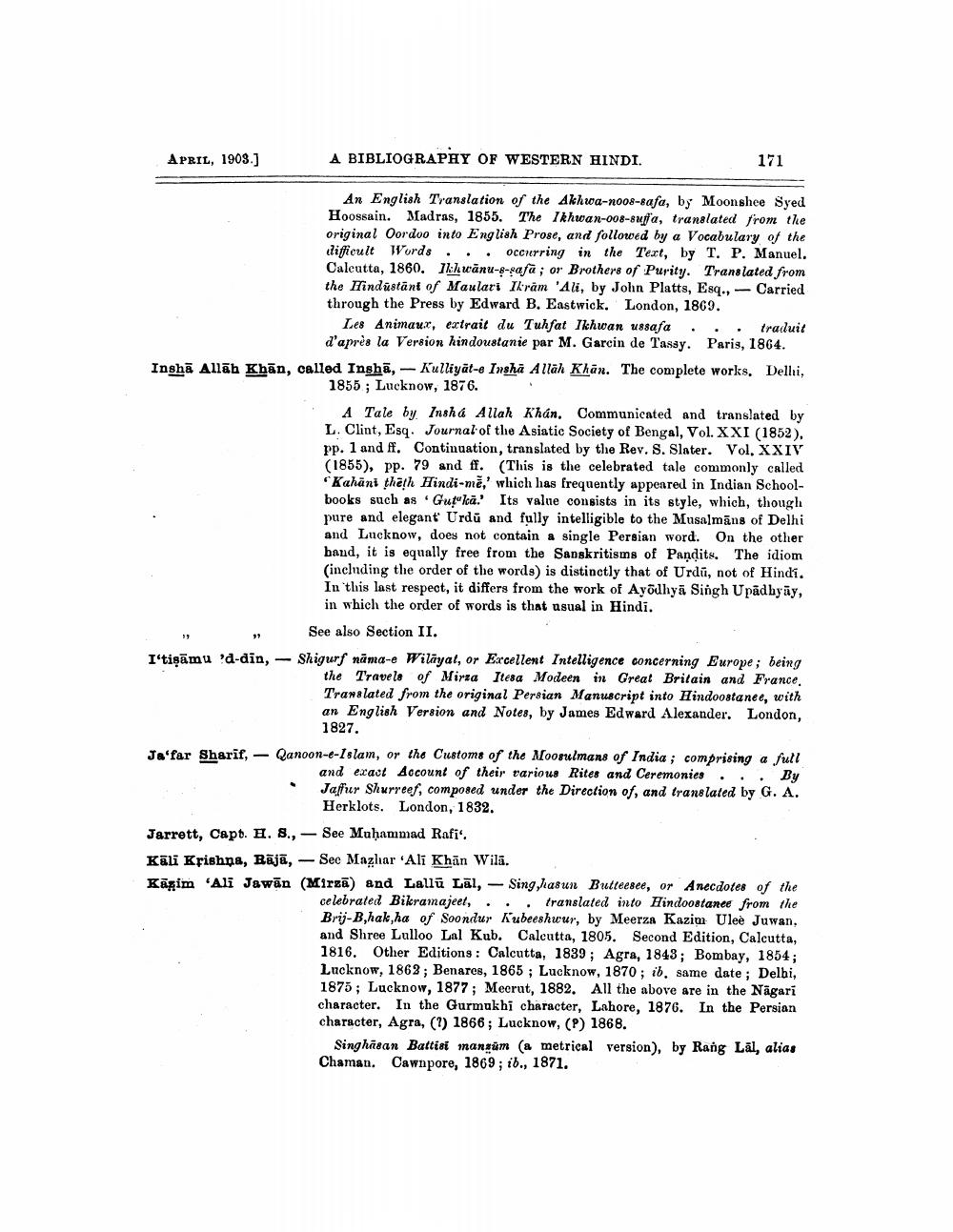________________
APRIL, 1903.]
37
I'tiṣāmu 'd-din,
Ja'far Sharif,
Insha Allah Khan, called Insha, - Kulliyat-e Insha Allah Khan. The complete works. Delhi,
1855; Lucknow, 1876.
—
A BIBLIOGRAPHY OF WESTERN HINDI.
171
A Tale by Insha Allah Khán. Communicated and translated by L. Clint, Esq. Journal of the Asiatic Society of Bengal, Vol. XXI (1852), pp. 1 and ff. Continuation, translated by the Rev. S. Slater. Vol. XXIV (1855), pp. 79 and ff. (This is the celebrated tale commonly called "Kahani theth Hindi-me,' which has frequently appeared in Indian Schoolbooks such as Gutka.' Its value consists in its style, which, though pure and elegant Urdu and fully intelligible to the Musalmans of Delhi and Lucknow, does not contain a single Persian word. On the other band, it is equally free from the Sanskritisms of Pandits. The idiom (including the order of the words) is distinctly that of Urdu, not of Hindi. In this last respect, it differs from the work of Ayodhya Singh Upadhyay, in which the order of words is that usual in Hindi.
See also Section II.
Shigurf nama-e Wilayat, or Excellent Intelligence concerning Europe; being
the Travels of Mirza Itesa Modeen in Great Britain and France. Translated from the original Persian Manuscript into Hindoostanee, with an English Version and Notes, by James Edward Alexander. London, 1827.
Jarrett, Capt. H. 8., 1 Kāli Krishna, Bājā, Kagim 'Ali Jawan
An English Translation of the Akhwa-noos-safa, by Moonshee Syed Hoossain. Madras, 1855. The Ikhwan-008-suffa, translated from the original Oordoo into English Prose, and followed by a Vocabulary of the difficult Words ... occurring in the Text, by T. P. Manuel. Calcutta, 1860. Ikhwanu-s-safa; or Brothers of Purity. Translated from the Hindustant of Maulari Ikräm 'Ali, by John Platts, Esq., Carried through the Press by Edward B. Eastwick. London, 1869.
Les Animaux, extrait du Tuhfat Ikhwan ussafa . . traduit d'après la Version hindoustanie par M. Garcin de Tassy. Paris, 1864.
Qanoon-e-Islam, or the Customs of the Moosulmans of India; comprising a full and exact Account of their various Rites and Ceremonies... By Jaffur Shurreef, composed under the Direction of, and translated by G. A. Herklots. London, 1832.
-
See Muhammad Rafi'.
See Mazhar Ali Khan Wilā. (Mirza) and Lallu Lal,
Sing,hasun Butteesee, or Anecdotes of the celebrated Bikramajeet, translated into Hindoostanee from the Brij-B,hak,ha of Soondur Kubeeshuur, by Meerza Kazim Ulee Juwan, and Shree Lulloo Lal Kub. Calcutta, 1805. Second Edition, Calcutta, 1816. Other Editions: Calcutta, 1839; Agra, 1843; Bombay, 1854; Lucknow, 1862; Benares, 1865; Lucknow, 1870; ib. same date; Delhi, 1875; Lucknow, 1877; Meerut, 1882. All the above are in the Nagari character. In the Gurmukhi character, Lahore, 1876. In the Persian character, Agra, (?) 1866; Lucknow, (P) 1868.
-
Singhasan Battisi mangam (a metrical version), by Rang Lal, alias Chaman. Cawnpore, 1869; ib., 1871.




